
Saint Kitts and Nevis, officially the Federation of Saint Christopher and Nevis, is an island country consisting of the two islands of Saint Kitts and Nevis, both located in the West Indies, in the Leeward Islands chain of the Lesser Antilles. With 261 square kilometres (101 sq mi) of territory, and roughly 50,000 inhabitants, it is the smallest sovereign state in the Western Hemisphere, in both area and population, as well as the world's smallest sovereign federation. The country is a Commonwealth realm, with Charles III as King and head of state.
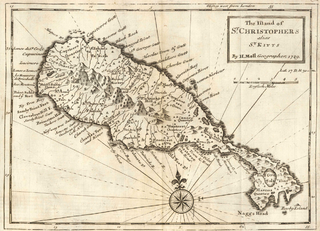
Saint Kitts and Nevis have one of the longest written histories in the Caribbean, both islands being among Spain's and England's first colonies in the archipelago. Despite being only two miles apart and quite diminutive in size, Saint Kitts and Nevis were widely recognized as being separate entities with distinct identities until they were forcibly united in the late 19th century.
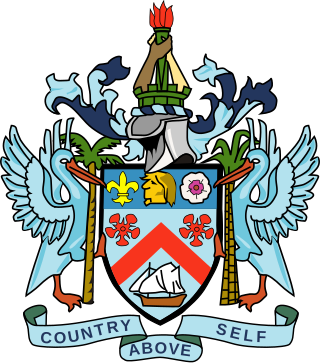
The politics of Saint Kitts and Nevis takes place in the framework of a federal parliamentary democracy. Saint Kitts and Nevis is an independent Commonwealth realm with Charles III as its head of state, viceregally represented by a Governor-General. He acts on the advice of the prime minister, who is the majority party leader in the National Assembly, and who, with a cabinet, conducts affairs of state.

Saint Kitts, officially Saint Christopher, is an island in the West Indies. The west side of the island borders the Caribbean Sea, and the eastern coast faces the Atlantic Ocean. Saint Kitts and the neighbouring island of Nevis constitute one country: the Federation of Saint Kitts and Nevis. Saint Kitts and Nevis are separated by a shallow 3-kilometre (2 mi) channel known as "The Narrows".

Basseterre is the capital and largest city of Saint Kitts and Nevis with an estimated population of 14,000 in 2018. Geographically, the Basseterre port is located at 17°18′N62°44′W, on the south western coast of Saint Kitts Island, and it is one of the chief commercial depots of the Leeward Islands. The city lies within Saint George Basseterre Parish.

The governor-general of Saint Kitts and Nevis is the representative of the monarch of Saint Kitts and Nevis, currently King Charles III. The appointed governor-general, currently Marcella Liburd, lives in Government House, Basseterre, which serves as her official residence.
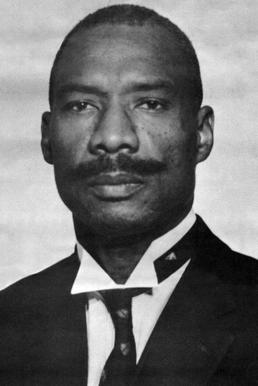
Robert Llewellyn Bradshaw was the first Premier of Saint Kitts and Nevis, and previously served as Chief Minister, legislator, and labour activist.

Saint Christopher-Nevis-Anguilla was a British colony in the West Indies from 1882 to 1983, consisting of the islands of Anguilla, Nevis, and Saint Christopher. From 1882 to 1951, and again from 1980, the colony was known simply as Saint Christopher and Nevis. Saint Christopher and Nevis gained independence in 1983 as the Federation of Saint Kitts and Nevis, while Anguilla would remain a British overseas territory.
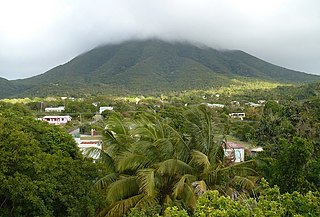
Saint George Gingerland, also known as St. George's Gingerland, is a parish in the southeastern part of the island of Nevis, Leeward Islands, West Indies. It is one of five parishes on the island, and has a total population of about 2,500. The five parishes, in combination with the nine parishes of St. Kitts, make up the fourteen administrative parishes of the two-island Federation of Saint Kitts and Nevis.

Saint John Figtree is one of five administrative parishes which make up the small Caribbean island of Nevis. These five parishes are part of the fourteen parishes that exist within the Federation of Saint Kitts and Nevis, a two-island country in the Leeward Islands, Lesser Antilles, West Indies.

Saint Paul Charlestown is one of 14 administrative parishes that make up Saint Kitts and Nevis. It is located on the island of Nevis, and the parish capital is Charlestown, which is also capital of the entire island.

Saint Thomas Lowland is one of 5 Nevis parishes which are in turn part of the 14 administrative parishes that make up the Federation of Saint Kitts and Nevis. Leeward Islands, Lesser Antilles, West Indies.

The National Assembly and the King of Saint Christopher and Nevis jointly make up the legislature of Saint Kitts and Nevis.

The monarchy of Saint Kitts and Nevis is a system of government in which a hereditary monarch is the sovereign and head of state of Saint Kitts and Nevis. The current monarch of Saint Kitts and Nevis, since 8 September 2022, is King Charles III. As sovereign, he is the personal embodiment of the Crown of Saint Kitts and Nevis. Although the person of the sovereign is equally shared with 14 other independent countries within the Commonwealth of Nations, each country's monarchy is separate and legally distinct. As a result, the current monarch is officially titled King of Saint Christopher and Nevis and, in this capacity, he and other members of the royal family undertake public and private functions domestically and abroad as representatives of Saint Kitts and Nevis. However, the King is the only member of the royal family with any constitutional role.
Windsor University School of Medicine is a private offshore medical school located in Cayon, Saint Mary Cayon Parish, Saint Kitts and Nevis in the Caribbean. Windsor confers upon its graduates the Doctor of Medicine (MD) degree. The university also has clinical education campuses in Carbondale, Illinois and Houghton Lake, Michigan. Administrative offices are located in Monee, Illinois.

Government House is the official residence of the lieutenant governor of Jersey. The building is situated in the parish of St Saviour in Jersey. It is also used for ceremonial functions, receptions and meetings with visiting foreign dignitaries and heads of state. It is also the official residence of the Duke of Normandy as head of state when staying in Jersey.
The Ministry of Foreign Affairs is the ministry responsible for handling the Federation of Saint Kitts and Nevis' external relations and its diplomatic missions abroad. The ministry's current director is Minister of Foreign Affairs and Aviation, Denzil Douglas.
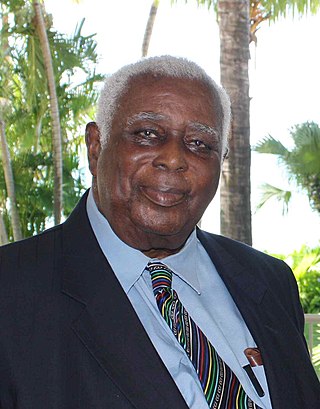
Sir Cuthbert Montraville Sebastian was the second governor-general of Saint Kitts and Nevis from 1996 to 2013. He was appointed Governor-General in 1995 and was sworn in on 1 January 1996. While in office, he was the world's oldest serving de facto head of state. His retirement was announced on 25 December 2012 and became effective on 1 January 2013.

Sir Samuel Weymouth Tapley Seaton, was the fourth governor-general of Saint Kitts and Nevis from 2015 to 2023.

















